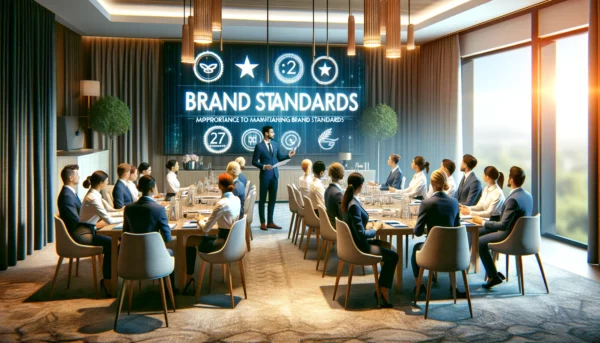In an era where the hospitality landscape is marked by fierce competition and ever-evolving guest expectations, one factor consistently stands out as a key differentiator: brand standards. These standards, encompassing everything from guest services to room design and operational efficiency, are not just guidelines but the linchpin of a hotel’s identity and success. In this comprehensive exploration, we delve into why maintaining brand standards is not just important but critical for hoteliers, especially in the eyes of discerning hotel buyers, sellers, and investors.
The Benefits of Maintaining Brand Standards
Brand standards in the hospitality industry serves as a beacon, guiding hotels towards excellence in service and operations. By setting a high bar for quality and consistency, these standards ensure that guests enjoy a uniform experience of luxury and comfort across different properties. This uniformity is crucial in building a robust brand reputation, as it fosters guest loyalty and encourages repeat business. A hotel that consistently meets or exceeds these standards is likely to see higher occupancy rates and can command premium pricing, distinguishing itself in a crowded market.
Key to this is the concept of a consistent guest experience. Brand standards ensure that whether a guest stays in a hotel in New York or Paris, they receive the same high level of service, attention to detail, and quality. This consistency is not just about maintaining a certain aesthetic or level of comfort; it’s about delivering a promise to every guest that walks through the doors.
Moreover, maintaining these standards has a direct impact on operational efficiency. When every department, from the front desk to housekeeping, understands and upholds the hotel’s standards, it reduces confusion and streamlines operations, leading to a smoother and more enjoyable guest experience.
Adherence vs. Non-Adherence to Brand Standards
The contrast between hotels that rigorously adhere to brand standards and those that don’t could not be starker. On one side, hotels that maintain these standards enjoy enhanced guest experiences, operational efficiency, and a competitive edge in the market. Guests at these establishments can expect top-notch service, from the welcoming ambiance of the lobby to the meticulous attention to detail in their rooms. This consistency not only builds customer trust and loyalty but also leads to positive word-of-mouth and repeat business.
In contrast, hotels that fail to uphold these standards often struggle with lower guest satisfaction and operational inefficiencies. This can manifest in various ways, from inconsistent service quality across different properties to a lack of cohesion in guest experiences. The repercussions extend beyond just immediate guest dissatisfaction; it impacts the hotel’s long-term reputation and financial health. Without the reliability that brand standards provide, these hotels find it harder to retain loyal customers and attract new ones, ultimately affecting their occupancy rates and profitability.
The Risks of Neglecting Brand Standards
Guests Perception
Neglecting brand standards in a hotel can significantly impact guest perception. Without adherence to these standards, guests may experience inconsistent service quality and a lack of cohesion in their overall experience. This inconsistency can lead to immediate guest dissatisfaction, tarnishing the hotel’s reputation and affecting long-term success. Moreover, without the reliability that brand standards provide, these hotels find it harder to retain loyal customers and attract new ones, ultimately affecting their occupancy rates and profitability.

Safety and Security
In safety and security, the risks of overlooking brand standards are particularly serious. Hotels are responsible for the safety and security of their guests, encompassing everything from physical security measures to digital data protection. A lack of robust security systems and well-trained staff can lead to safety lapses, legal challenges, and financial losses. Additionally, in today’s digital age, ensuring the security of guest data is crucial. Neglecting cybersecurity measures can result in data breaches, severely damaging the hotel’s credibility and trust.
Valuation and Investment Attractiveness
For hotel investors, a property’s adherence to brand standards is often a key indicator of its operational health and potential for long-term success. Hotels that neglect these standards may struggle to attract investment or achieve favorable valuations during refinancing or sale processes. Maintaining high standards is not only vital for guest satisfaction but also crucial for the hotel’s overall market value and attractiveness to potential investors.
Real-World Examples of Brand Standards in Action
Examining real-world examples offers tangible insights into the impact of adhering to brand standards. For instance, consider a hotel chain that implemented a comprehensive digital checklist and audit system for their housekeeping and food services. This move significantly enhanced their operational efficiency and guest satisfaction, leading to an increase in repeat business and positive reviews. By standardizing procedures and ensuring consistency across all properties, this hotel chain maintained a high level of service that guests came to expect and appreciate.
Another example is a luxury hotel that focused on training its staff to exceed guest expectations. Through rigorous training programs and regular performance evaluations, the hotel ensured that each staff member embodied the brand’s commitment to excellence. This dedication to service excellence not only increased guest loyalty but also elevated the hotel’s reputation in a competitive market.
Strategies for Upholding and Exceeding Brand Standards

- Continuous Staff Training: Regular and comprehensive training programs are essential. They equip staff with the necessary skills and knowledge to deliver service that aligns with the hotel’s brand standards. This includes everything from guest interaction to handling specific operational procedures.
- Quality Control and Regular Audits: Implementing stringent quality control measures and conducting regular audits ensures that all aspects of the hotel, from guest services to room cleanliness, meet the set standards. This also helps in identifying areas for improvement.
- Leveraging Technology: Embracing technological advancements can significantly enhance operational efficiency and guest experience. From automated check-ins to digital concierge services, technology can play a pivotal role in maintaining and exceeding brand standards.
- Guest Feedback and Responsiveness: Actively seeking and responding to guest feedback is crucial. It provides valuable insights into how well the hotel meets guest expectations and where it can improve.
- Attention to Detail: Small details often make a significant difference in guest experience. Paying attention to these details and ensuring that every aspect of the hotel reflects the brand’s commitment to excellence is key.
- Innovation and Adaptability: Staying abreast of industry trends and being adaptable to change is essential. This could mean updating amenities, redesigning spaces, or introducing new services that align with evolving guest preferences.
Impact on Hotel Valuation for Refinancing or Sale
Operational Excellence: Hotels that adhere to high brand standards typically showcase operational efficiency and consistency in service delivery. This operational excellence translates into better financial performance, making these properties more appealing for refinancing or acquisition.
Guest Satisfaction and Loyalty: High guest satisfaction and loyalty are direct outcomes of maintaining brand standards. Satisfied guests are more likely to return and recommend the hotel to others, leading to increased occupancy rates and revenue. This consistent revenue stream is a key factor in determining a hotel’s market value.
Brand Reputation: A strong brand reputation built on maintaining high standards is a significant asset. It differentiates the hotel in a competitive market and can command higher room rates, further enhancing its valuation.
Elevating Hotel Success Through Brand Standards: Next Steps
In summary, the commitment to brand standards is a critical factor in defining a hotel’s success in the competitive hospitality industry. These standards are integral to ensuring operational excellence, guest satisfaction, safety, and significantly influence a hotel’s market valuation. As the hospitality landscape continues to evolve, it is imperative for hotels to not only meet but exceed these standards to remain relevant and attractive to both guests and investors.
For hotel buyers, sellers, or investors looking to navigate the complexities of the hotel industry, understand the nuances of brand standards, or seek opportunities for investment and growth, NewGen Advisory is your ideal partner. Our expertise and insights into market trends and industry best practices are invaluable for making informed decisions that align with your strategic goals. Contact us today.


